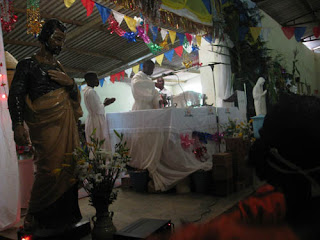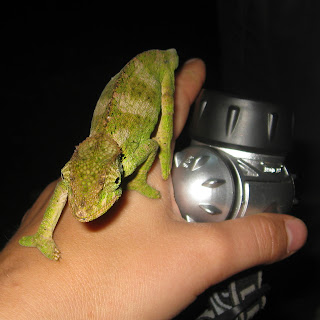Bwiza finally came around 8:30, half an hour late, and we walked down to her house, where I explained the American custom of Christmas gifts. I presented her with a small gift and gave Adolph a wind-up frog toy my parents’ had sent. I have never in my life seen a child take such joy in a gift. He laughed hysterically every time the frog did its backflip. His 8-year-old uncle also got a kick out of the toy, and was a little more adept at winding it.
 Bwiza explained that the Catholic church in our village had changed its program and was not holding services. Christmas mass would instead be at a church “ku mazi:” by the water. It would be a long walk, perhaps an hour and a half, so they were not sure I would be able to do it. “No problem!” I explained, “I just want to return home to change my shoes.” I changed from heels to chacos, threw a granola bar, water bottle, sunscreen and raincoat (you never know which you will need) into a bag, and we set off on our Christmas hike.
Bwiza explained that the Catholic church in our village had changed its program and was not holding services. Christmas mass would instead be at a church “ku mazi:” by the water. It would be a long walk, perhaps an hour and a half, so they were not sure I would be able to do it. “No problem!” I explained, “I just want to return home to change my shoes.” I changed from heels to chacos, threw a granola bar, water bottle, sunscreen and raincoat (you never know which you will need) into a bag, and we set off on our Christmas hike.  The road/path to the church was one I’d been meaning to explore for several months, and it was great to finally see the winding road towards the water. It was mostly downhill on the way there, and we traversed several bridges that consisted of only one or two logs: balance beams. As we drew near the church, crowds surrounded us in both directions. Some were headed towards our 10am mass while others were departing the earlier mass. As a white girl in a dress tailored form local fabric, I drew more than a few stares as I joined hands with Bwiza and her brother to weave through the well-dressed throngs.
The road/path to the church was one I’d been meaning to explore for several months, and it was great to finally see the winding road towards the water. It was mostly downhill on the way there, and we traversed several bridges that consisted of only one or two logs: balance beams. As we drew near the church, crowds surrounded us in both directions. Some were headed towards our 10am mass while others were departing the earlier mass. As a white girl in a dress tailored form local fabric, I drew more than a few stares as I joined hands with Bwiza and her brother to weave through the well-dressed throngs.The church is perhaps the biggest building I’ve seen in my district; there must have been three thousand or more worshippers from several sectors crowded onto the benches, which had long supports on the ground so that they could also be knelt upon for prayer. There was a group of boys drumming outside and a generator to power the Christmas light display and sound system.
Inside, the church was decked out with festive metallic streamers, a few pseudo-Christmas trees, and flowers. There was even a nativity scene!
Although Catholics have a reputation for short services (short meaning perhaps two hours), mass dragged for almost three hours. It was a sunny day and we were the third group of several thousand people to cram together under the tin roof, so it was hot. I regretted not bringing a fan. At one point Bwiza mercifully proposed that we go outside, “to take oxygen,” would be the literal French translation. She then got a taste of what it’s like to be a muzungu: as we rested in the fresh air and shade of the church, scores of children crowded within a few feet of us, impervious to commands of “musubire” (to move back).
 We returned for the end of services, which included sitings of a Red Sox championship shirt and a Youkilis jersey, pictured (as the three hour mark ticked by, this was very entertaining to me). Finally we poured out of the church and greeted others from the village, including the health center titulaire and his wife, and Mama Benjamin.
We returned for the end of services, which included sitings of a Red Sox championship shirt and a Youkilis jersey, pictured (as the three hour mark ticked by, this was very entertaining to me). Finally we poured out of the church and greeted others from the village, including the health center titulaire and his wife, and Mama Benjamin.  We walked back, uphill, with Mama Benjamin and her son and a couple others from near Kinihira. It began to rain, so we sought shelter for a while in a stranger’s house. By the time we returned, maybe two and a half hours after we left the church, I was exhausted.
We walked back, uphill, with Mama Benjamin and her son and a couple others from near Kinihira. It began to rain, so we sought shelter for a while in a stranger’s house. By the time we returned, maybe two and a half hours after we left the church, I was exhausted. After a brief rest, Bwiza knocked on my door and invited me to dinner. At her house, she served me beef in a red sauce. Given that she probably buys meat only two or three times a year, it was an incredible honor to share this meal with her.
My evening was capped off with Christmas TV specials on my iPod, hot chocolate, wonderful phone calls from friends and family, and the making of a Christmas bananagram - it's imperative to play with the new toys on Christmas day!
Do they know it’s Christmas? Rwandans definitely knew it was Christmas, and some went to church or prepared a special meal, but for the most part they didn’t make nearly the fuss about Christmas that we do.
Sweet Potato Pudding
* 1 cup milk
* 2 eggs
* 2 1/2 cups sliced sweet potatoes (I grated them by hand, and because they are white threw in some carrot for the orange)
* 1 cup sugar
* 1 tsp cinnamon
* 1 tsp nutmeg
* 1/2 tsp ground cloves
* 1/4 tsp salt
* 1 tsp lemon or lime zest
* 1 tsp vanilla
Preparation:
In a blender, combine the milk and eggs; process until well mixed. Add sweet potato slices and process until potato is shredded fine. Add remaining ingredients; blend well.
Note: You may also shred the sweet potatoes finely with a shredder or food processor and beat ingredients with a hand mixer.
Pour mixture into a well-greased 1 1/2-quart baking dish. Bake in a 350 degree oven for 1 hour or until knife inserted in the center comes out clean. Serve warm or cold, with whipped cream or ice cream.
Serves 4.





















































